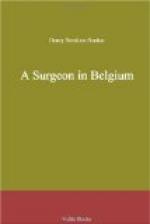The effects of rifle-fire, particularly at short ranges, have led to a great deal of discussion, and each side has accused the other of using dum-dum bullets. The ordinary bullet consists of a lead core with a casing of nickel, since the soft lead would soon choke rifling. Such a bullet under ordinary circumstances makes a clean perforation, piercing the soft tissues, and sometimes the bones, with very little damage. In a dum-dum bullet the casing at the tip is cut or removed, with the result that, on striking, the casing spreads out and forms a rough, irregular missile, which does terrific damage. Such bullets were forbidden by the Geneva Convention. But the German bullet is much more subtle than this. It is short and pointed, and when it strikes it turns completely over and goes through backwards. The base of the bullet has no cover, and consequently spreads in a manner precisely similar to that in a dum-dum, with equally deadly results. There could be no greater contrast than that between the wounds with which we had to deal in South Africa, produced by ordinary bullets, and those which our soldiers are now receiving from German rifles. The former were often so slight that it was quite a common occurrence for a soldier to discover accidentally that he had been wounded some time previously. In the present war rifle wounds have been amongst the most deadly with which we have had to deal.
It will thus be seen that in most cases the wounds were anything but clean-cut; with very few exceptions, they were never surgically clean. By surgically clean we mean that no bacteria are present which can interfere with the healing of the tissues, and only those who are familiar with surgical work can realize the importance of this condition. Its maintenance is implied in the term “aseptic surgery,” and upon this depends the whole distinction between the surgery of the present and the surgery of the past. Without it the great advances of modern surgery would be entirely impossible. When we say, then, that every wound with which we had to deal was infected with bacteria, it will be realized how different were the problems which we had to face compared with those of work at home. But the difference was even more striking, for the bacteria which had infected the wounds were not those commonly met with in England. These wounds were for the most part received in the open country, and they were soiled by earth, manure, fragments of cloth covered with mud. They were therefore infected by the organisms which flourish on such soil, and not by the far more deadly denizens of our great cities. It is true that in soil one may meet with tetanus and other virulent bacteria, but in our experience these were rare. Now, there is one way in which all such infections may be defeated—by plenty of fresh air, or, better still, by oxygen. We had some very striking proofs of this, for in several cases the wounds were so horribly foul that it was impossible




